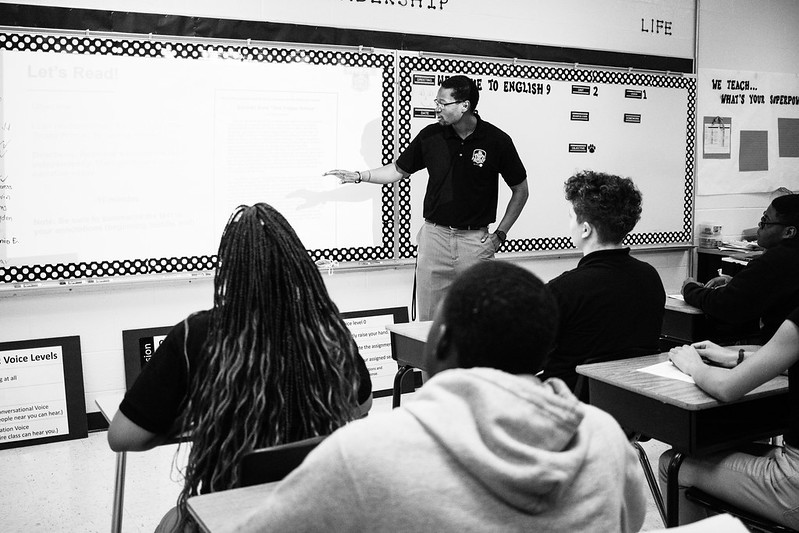Male African American teachers play key role at Fairley HS

Male African American teachers are playing a key role at Memphis’ Fairley High School, mentoring black male students, and helping them make the correct decisions as they prepare them for college, leadership, and life.
At Fairley, 52 percent of the enrolled students are male African Americans, as well as 32 percent of the teaching staff. Julius Blackburn, principal at the Memphis school, believes that having walked the path of the students before becoming educators helps them guide them as they transition into adulthood.
“That life component… there’s only so much life that we can prepare them for if we hadn’t walked in the same shoes they have,” explains Blackburn, himself a product of inner-city schools. “The impact is far more greater when I can say: hey, I’ve been in your shoes, I know how it feels to be in school as a black boy in school where the curriculum might not necessarily reflect me. Just being able to relate or have that relatability with our kids is so critical to the success of our students.”
Eight of the 22 teachers at the school are male African Americans, as well as the boys and girls basketball and football coaches. Most of the security staff is black, which according to Blackburn, gives their students a sense of representation and someone to go to when they might get carried away in the heat of the moment and shift the perspective on difficult decisions they might face.
“The way it’s looking is that our teachers are reflecting the population we have here. It’s reflecting in the relationships we have with our kids; it’s reflecting in the responses that we get from our students,” adds Blackburn. “It’s also important that students have people that look like them represented in our staff. So, we have to make sure that students see examples, good examples of people who look like them.”
These relationships have been fruitful so far. This year, the suspension rates has been lower than in the 2021-2022 school year, a continued trend of improvement, which in the principal’s opinion reflects the impact that the male African American teachers have made on the school.
“Our suspension rate is relatively lower than what it was last year and I want to partly attribute that to the relationships, the classroom management, the ability to make to form and continue to develop connections with our students,” explains Blackburn. “We have several people who can step in in a mentor role when it comes to getting our students to do the right thing. We know that just suspending children does not change behaviors. It’s a band-aid on a problem that has a root cause.”
Blackburn shared examples of how male African American teachers are able to change a student’s perspective, Patavious Isom being the prime example. The influential rapper, known as Duke Deuce, is a Fairley graduate and if not for band director Michael Cowan, his path would have been a different one.
“Being in a band with Mr. Cowans changed his life and changed his trajectory and he realized that he could take his music seriously,” said Blackburn, who was a band member in high school. “I can relate to him in the music aspect. I was in band, but I couldn’t reach him in the way that Mr. Cowans reached that person.”
Blackburn also highlighted Frederick Copeland’s role in helping his players through difficult times and decisions and how he can relate to them in the football field. “Our football coach does a great job in fostering relationships with our students so when those students have moments of crisis or moments of momentary lack of judgement, our coach can tap in and relate to the football field or relate to what they may have in common to ultimately get the students to do the right thing.”
Fairley’s principal, himself, is an example of how a male African American teachers changed his perspective as a young black student in Middle School. At present, he still sees him as a mentor and reaches out for guidance.
“I still think about my black male teachers. I only had two during my entire tenure in school and I have one still in education and I look at him as a mentor and I still remember the impact he had on my in a classroom as my seventh grade science teacher,” remember Blackburn. “I can reach out to this day to him and ask for support to guide me in my education career and to have him in a teacher role… it is so important because not only gives you the academic component but also giving our students the life component, saying I’ve been in your shoes, I know how it feels to walk the same, with the same obstacles you had and it can be done.”
Blackburn is confident that many more African American students make the decision to become teachers in such a way that they can help their peers. At present, many kids look to athletes as examples to follow, but few can achieve the status that basketball and football players have.
“There are things that only African American teachers can relate to our students with respect to that story. Representation is a key motivating factor for our students… the NBA is what, 85% African Americans, but the chances to get there are so slim, the NFL, same way. But you can become an educator, you can graduate college and become an educator, is an attainable goal,” said Blackburn. “And for my young black men it’s important that they see our faces in school as a constant reminder of what education looks like, what success looks like and what representation should be alike. We have that here at Fairley High School.”
